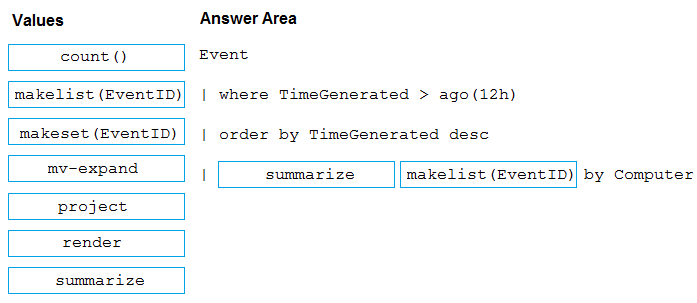
Expert Verified, Online, Free.

DRAG DROP -
You have several Azure virtual machines that run Windows Server 2019.
You need to identify the distinct event IDs of each virtual machine as shown in the following table.
How should you complete the Azure Monitor query? To answer, drag the appropriate values to the correct locations. Each value may be used once, more than once, or not at all. You may need to drag the split bar between panes or scroll to view content.
NOTE: Each correct selection is worth one point.
Select and Place:

an26
Highly Voted 3 years, 5 months agomonniq
3 years, 4 months agoAlbelev
3 years, 3 months agoAlMargoi
2 years, 9 months agoWebpilot
1 year, 2 months agoZonq
Highly Voted 3 years, 5 months agochloaus
Most Recent 5 months agoozbonny
6 months, 2 weeks agogabo
11 months, 2 weeks agoyana_b
1 year agoTyler2023
1 year, 1 month agowiliammbr
1 year, 2 months agoWhatsamattr81
1 year, 7 months agonetworkmaniac01
1 year, 7 months agoxRiot007
1 year, 1 month agosrine69
1 year, 11 months agosrine69
1 year, 11 months agosyu31svc
2 years agoGovcomm
2 years, 1 month agoLeandrocei
2 years, 2 months agoEltooth
2 years, 3 months agoUnknowMan
2 years, 4 months ago